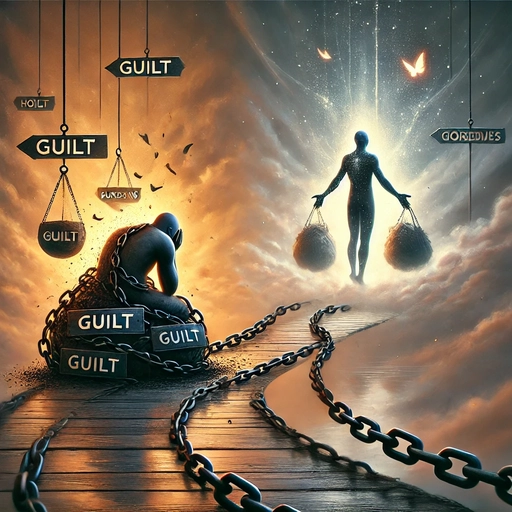Guilt is anger directed at ourselves–at what we did or did not do.
— Peter McWilliams
In February last year I realised I had a blog post to write about this. Finally, I’ve done it.
Several years ago I chose to give up feeling guilty over my actions. Growing up I often felt guilty; I’d say I was made to feel guilty, but it is something we can consciously choose not to feel, so it’s wrong to say you are made to feel guilty.
Guilt is a feeling that occurs when you know or suspect that you have hurt someone, either through action or inaction.
Neurotic guilt, that is guilt that cannot receive forgiveness, tends to be vague and pervasive. It responds to the slightest provocation, often becoming preoccupied with self-condemnation and self-punishment.
To develop a healthy guilt response, you must challenge your irrational internalized do’s and don’t, thus developing a more rational and flexible conscience, a right attitude to failure, and the courage to take responsibility for mistakes without engaging in self-punishment.
To deal with guilt, you need to look back on your actions and decide if you would do them again in the same circumstances. If you would do them again, then you must accept that they are a part of yourself. You should not feel guilty for doing things within your nature.
If, in hindsight, you regret your actions, you will not want to repeat them. Think about how you would have preferred to do something; next time, you will have a better chance of getting a better outcome. If you cannot see a way of doing better, accept your actions and refer to the preceding paragraph. Either way, you have learnt and can move on.
Inaction may be the biggest form of action.
— Jerry Brown
Sometimes, there is a choice between two actions, neither of which is desirable, and you would choose a third option if available. Whatever you decide to do still fits the above, that you would choose the same thing again as the alternative was worse or wish you had chosen the alternative. Either way, you have thought about your actions and can move on. You can always decide to make amends.
In either situation, you can make amends. This is a separate action, and if it’s something you don’t want to do, then accept it. Making amends can remove some of the feelings of guilt, especially if you would repeatedly do it. Your guilt may exist because you have not chosen to make amends.
Sometimes, acknowledging the things you feel guilty about is enough to make amends. If you are too proud to admit that you screwed up, you can aggravate your feelings of guilt, especially if you keep getting reminded, intentionally or not, of your actions.
One consequence of making amends may be that you upset someone else because he feels guilty in his own way. His way of dealing with feelings of guilt may be to push others away, and your repeated attempts to make amends keep him reacting to his feelings of guilt. Either way, you’re doing this to improve things, so just decide whether or not you would do the same thing again.
It really doesn’t matter if the person who hurt you deserves to be forgiven. Forgiveness is a gift you give yourself. You have things to do and you want to move on.
— Real Live Preacher
Forgiveness can be a solution to guilt. My mother seemed to never forgive anyone, and I think this made her quite bitter about many things. I did not want to be like that.
The weak can never forgive. Forgiveness is the attribute of the strong.
— Mahatma Gandhi
When I lived in Edinburgh, I realised that forgiving someone was what I needed to do for myself. I was angry at some of my brother’s actions and how he was hurting people I knew. He didn’t know I was angry, so there was no point in telling him I’d forgiven him. All that would do was lead to conflict. He was doing what he needed to do at the time. I forgave him for myself. Now we have a good relationship.
I’ve found that by knowing the situation and analysing it (I can’t stop analysing things; it’s what I do), it becomes easier to forgive someone, even for actions you are not supposed to be aware of. It’s also possible to forgive someone for their actions when they react to unacknowledged guilt.
Sometimes, one refuses to acknowledge events he feels really guilty about, even though I find it easy to understand why he would do that. With understanding comes forgiveness.
I find I have a great capacity for forgiveness. It’s easier for me to forgive someone I care about, or someone who makes an effort to make amends. It’s most difficult for someone I don’t particularly care about but whom I must interact regularly with and who continues to repeat their actions. The severity of someone’s actions influences forgiveness. I’m sure one day I will forgive Tineke Vlooswyk, who was the flatmate of mine who moved to Australia deliberately leaving me with unpaid bills.
Here’s another view, dealing with Guilt and Shame.
Addendum: I realise that you can be suffering from guilt and not ready to accept or even acknowledge forgiveness.


Leave a Reply